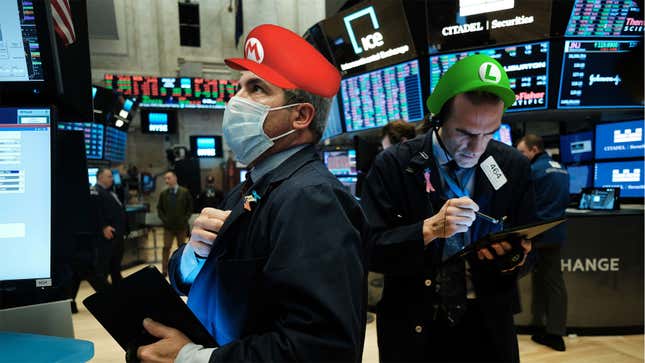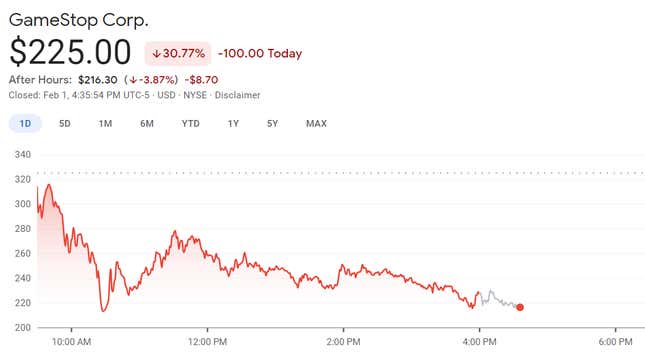
GameStop’s rollercoaster ride through the absurd machinery of the stock market has been fun to watch. It sent some of CNBC’s finest minds scrambling to Wikipedia to find out what Reddit is and allowed for Very Serious Thought Leaders to peddle all sorts of pet theories, like blaming GameStop’s unlikely rise on young men not having enough sex. It even drove one billionaire to whine on national TV, blaming the stock’s antics on people “sitting at home getting their checks from the government” and calling attacks on rich people to pay their fair share “a bullshit concept.” But we all know how it ends. For a lot of people who actually invested in meme stocks, it won’t be pretty. And the rest of us will be left with the same broken economy as before.
Bubbles start small. Then they get big. Inevitably, they pop. Those who get in early and rde the wave up can cash out and get rich. If you’ve been following the GameStop story at all, you’ve probably heard plenty of stories about people who made out big. Redditor DeepFuckingValue, who started with an initial investment of around $50,000, showed the Wall Street Journal it was worth over $31 million as of January 28. Others have made much more modest sums, like the 10-year-old who cashed in $60 worth of stock bought back in 2019 for over $3,000 last week. Even On The Media’s Brooke Gladstone made out. Those who get in late often get nothing. Or worse, they lose it all. Whether GameStop stock blows up today (at the time of writing, it’s still trading above $200) or shortly after its next earnings report, everyone knows it likely will. Then all we’re still left with is a country where dozens of people became billionaires last year even as millions of others lost their jobs.
GameStop’s stock rally began with clever investors on the finance subreddit WallStreetBets, realizing a bunch of big hedge funds had severely over-shorted the dying brick-and-mortar video game retailer. They moved to place counter-bets.
Prior to the short squeeze, GameStop got a big vote of confidence in 2019 from Michael Burry, the investor portrayed in The Big Short for profiting off of the worst economic recession in nearly a century. The company was then buoyed by Chewy.com founder Ryan Cohen. His company, which was sold to PetSmart for $3.35 billion, sells pet supplies online. Cohen invested big last year and was named to GameStop’s board just last month. Rich people, in other words, saw an opportunity to get even richer.
WallStreetBets started calling him “Papa Cohen” and told tales of being taken to the moon on rocket ships made of “tendies” once the pet food genius transformed GameStop into a digital company. The community turned the solid technical case behind buying GameStop stock to put a big squeeze on the investors shorting it into a meme that ended up whipping together enough interest and excitement from other corners of the internet from people who wanted to be in on the joke, stick it to powerful financial interests, and maybe even win some easy money in the process. Whatever happens to the everyday redditors, Papa Cohen will likely do just fine. As of last week, his initial $76 million investment in GameStop was valued at nearly $1.4 billion. Having bought in so early, he’ll likely still make out like a bandit even after the stock hits bottom again.
The same can’t be said for those people who actually make the company its money by selling games in its stores. GameStop’s meme stock moment comes not only when more and more people are buying games digitally but also after months of covid-19-related lockdowns and store restrictions.

“I just got hired last month, and the company is severely slashing hours,” one current employee told Kotaku in an email.
“I fear this is the end,” wrote another employee who said management wasn’t providing enough scheduling hours to adequately staff the store while still expecting things to operate as close to normal as possible. “I’m petrified all our shareholders will see this as an opportunity to sell off and get out. In two months, give or take, I could be out of a job.”
She said these past few weeks were the lowest her morale had ever been at the company. Both employees requested anonymity because they are not authorized to speak to the press.
The first weekend after GameStop’s stock started breaking records, you’d have been hard-pressed to find anyone talking about it on the GameStop subreddit, a small online hangout for the thousands of the company’s employees and customers. Instead, they were debating the minimum wage following calls by the freshly inaugurated Biden administration to raise it over time to $15 an hour, around what many current GameStop store managers make.
“Most likely will hasten the closing of stores,” wrote one person. “They are closing hundreds of stores this year anyway,” retorted another.
Minimum wage talk can be a thorny issue in retail, not because people don’t want to make more money, but because they’re afraid, especially at struggling legacy retailers, that any boost could cost them their jobs entirely. At the same time, it’s clear the current status quo is untenable.
“Managers make approximately $15, assistant managers make $12.50,” one current employee told Kotaku in an email. “They are in charge of entire retail locations: scheduling, hiring, marketing, merchandising, etc. I have seen and applied for jobs on a whim that equate to a shelf stocker at other larger retail stores that start at $13. So running a store, to GameStop, is valued the same as other retailers value their shelf stockers. This then comes with the added insult of not even having hazard pay or a bonus for working in current world conditions.”
Last March, when covid-19 infection rates first started ramping up in the US, GameStop store employees reported not receiving proper guidelines or supplies from the company to operate safely during a pandemic. When state governments tried to institute lockdowns to stop the spread, GameStop management tried to claim its stores counted as “essential retail” so they could stay open. While some traders are getting rich off GameStop’s Wall Street moment, its workers are coming up on the anniversary of one of the toughest years in recent memory.
“Personally, I want another dollar or two raise just as compensation for not being able to enforce six-foot distancing or mask requirement policies,” a current employee said. “It’s insulting that GameStop so obviously doesn’t care about its employees’ physical, mental, or financial health.”
GameStop’s soaring stock price started as a story about edgelord day traders on Reddit outsmarting some big hedge funds. And that’s certainly true. Some unlikely people really have made a bunch of money, while investment firms like Melvin Capital, founded by someone whose previous firm was shut down for insider trading, really have lost billions of dollars for having their bad bets exposed. You don’t have to buy in to the myth that commission-free apps like Robinhood are democratizing the stock market by gamifying it into FanDuel for finance to take joy in seeing rich people get hit where it hurts.
“It finally felt like, for so many people at home who were seeing this happen, people were really feeling like everyday people were able to collectively organize and get back at the people who have historically had all the marbles on Wall Street and forced one hedge fund into an existential crisis,” Rep. Alexandria Ocasio-Cortez said during a Twitch stream.
Almost nobody went to jail for causing millions to lose their jobs and homes during the 2008 financial crisis. Over a decade later, in month 11 of self-quarantine, people on Reddit managed to make at least some of them pay in one of the goofiest and most public ways possible.
But as one of Ocasio-Cortez’s guests, financial reform policy analyst Alexis Goldstein noted during the livestream, the system overall is still rigged and still profits no matter which way particular stocks go.
“They don’t care if the market goes up or down. They make money on volatility,” she said.
Just like Robinhood makes money when hundreds of thousands more people download its app even if those new users lose money gambling on it. Other big hedge funds have made bank in the wake of the WallStreetBets hype machine as well.
“What we’re seeing right now is a guy who rolled up with a pocket full of change hitting the jackpot on a penny-slot,” wrote Discourse Blog’s Jack Crosbie. “The other thing, of course, is that watching a guy hit a jackpot is really only good for the casino because everyone who sees him do it thinks they’re going to be the next one to hit.”
Sen. Elizabeth Warren used the same metaphor last week when she called for the Securities and Exchange Committee to investigate the GameStop situation for market manipulation. Meanwhile, there have been calls in both chambers of Congress to hold hearings. It’s unclear, though, how much of anything that happened last week was actually illegal rather than simply one of the more absurd manifestations of the system working the way Wall Street wants it to work. You might think a pandemic would be bad for the stock market, and yet, in a year that saw the spread of covid-19 kill nearly 400,000, CNBC reported “massive stock market gains.”
As cathartic as it’s been to watch the shell game around GameStop unfold, it doesn’t pay unemployment, fund school reopenings, send $2,000 relief checks, or give out vaccines. So far, it doesn’t even pay GameStop employees. Memes are fun, but they don’t put food on the table or pay the bills, as much as the internet sometimes tricks us into believing that they can. And soon enough, GameStonk will fall down the memory hole just like all the others.
Correction - 8:46 p.m. ET, 2/1/21: A previous version of this article misidentified when billionaire Leon Cooperman, accused of insider trading in 2010, cried on national TV. It was actually during late 2019 when discussing Trump’s inability to act presidential, not earlier this month while discussing GameStop’s stock volatility. Kotaku regrets the error.